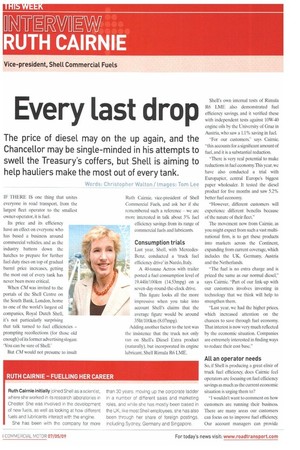Every last drop
Page 18

Page 19

If you've noticed an error in this article please click here to report it so we can fix it.
The price of diesel may on the up again, and the Chancellor may be single-minded in his attempts to swell the Treasury's coffers, but Shell is aiming to help hauliers make the most out of every tank.
Words: Christopher Walton/Images: Torn Lee
IF THERE IS one thing that unites everyone in road transport, from the largest fleet operator to the smallest owner-operator, it is fuel, Its price and its efficiency have an effect on everyone who has based a business around commercial vehicles, and as the industry battens down the hatches to prepare for further fuel duty rises on top of gradual barrel price increases, getting the most out of every tank has never been more critical.
When CM was invited to the portals of the Shell Centre on the South Bank, London, home to one of the world's largest oil companies, Royal Dutch it's not particularly surprising that talk turned to fuel efficiencies — prompting recollections (for those old enough) of its former advertising slogan: You can be sure of Shell.'
But CM would not presume to insult Ruth Cairnie, vice-president of Shell Commercial Fuels, and ask her if she remembered such a reference — we are more interested in talk about 3% fuel efficiency savings from its range of commercial fuels and lubricants
Consumption trials
Last year, Shell, with MercedesBenz, conducted a 'truck fuel efficiency drive' in Nardo, Italy.
A 40-tonne Actros with trailer posted a fuel consumption level of 19.441it/100km (14.53mpg) on a seven-day-round-the-clock drive.
This figure looks all the more impressive when you take into account Shell's claims that the average figure would be around 35lit./100km (8.07mpg).
Adding another factor to the test was the insistence that the truck not only ran on Shell's Diesel Extra product (naturally), but incorporated its engine lubricant, Shell Rimula R6 LME. Shell's own internal tests of Rimula R6 LME also demonstrated fuel efficiency savings, and it verified these with independent tests against 10W-40 engine oils by the University of Graz in Austria, who saw a 1.1% saving in fuel.
"For our customers," says Cairnie, "this accounts for a significant amount of fuel, and it is a substantial reduction.
"There is very real potential to make reductions in fuel economy.This year, we have also conducted a trial with Europapier, central Europe's biggest paper wholesaler. It tested the diesel product for five months and saw 5.2% better fuel economy.
"However, different customers will experience different benefits because of the nature of their fleet."
The movement now from Cairnie, as you might expect from such a vast multinational firm, is to get these products into markets across the Continent, expanding from current coverage, which includes the UK, Germany, Austria and the Netherlands "The fuel is no extra charge and is priced the same as our normal diesel," says Cairnie. "Part of our link-up with our customers involves investing in technology that we think will help to strengthen them.
"Last year, we had the higher prices, which increased attention on the chances to save through fuel economy. That interest is now very much reflected by the economic situation. Companies are extremely interested in finding ways to reduce their cost base."
All an operator needs
So, if ShJI is producing a great elixir of truck fuel efficiency, does Cairnie feel operators are focusing on fuel efficiency savings as much as the current economic situation is urging them to?
"I wouldn't want to comment on how customers are running their business. There are many areas our customers can focus on to improve fuel efficiency. Our account managers can provide advice and leaflets on fuel-efficient driving," she answers diplomatically and pragmatically.
But this leads on to the wider point that Shell, over the past seven years, has moved to become an integral part of some operators' day-to-day lives, Its account manager network not only offers ways to pay for fuel at the pumps across Europe, but also offers ways in which to manage financial outgoings on the roads, crossing tolls and even when using ferries.
"In Europe, we have some 20,000 fuel sites where the euroShell card is accepted. Of those, 2,500 have specific facilities for trucks, as well as high-speed fuel pumps and amenities for drivers.
"We have recognised that the needs the customers have are very specific. Our account managers are working in partnership with customers, who understand what their needs are and work in line with their needs.
Looking for ideas
"With the euroShell card, the haulage company can have their driver use one card to pay for most of the services they need on their journey. It saves drivers carrying around large amounts of cash," she says. 'Also, for those who are driving around Europe, their VAT recovery is important, so we can provide that, too."
These links with the haulage and logistics arena are part of what Cairnie refers to as "a dialogue': Gone are the days when 'Big Oil' could just pump diesel straight out of the ground and into trucks. Cairnie wants to understand how the road transport business is developing, and declares that she is "always interested in picking up ideas" from operators.
"Our investment in technology and developing new products is very much aimed at the long term," she insists.
With the Treasury intent on wringing every drop of tax revenue out of the fuel put into commercial vehicles, at least one of the companies that brings diesel to the pumps is looking to make sure the haulage industry can squeeze all it can out of every last drop.












































































































































